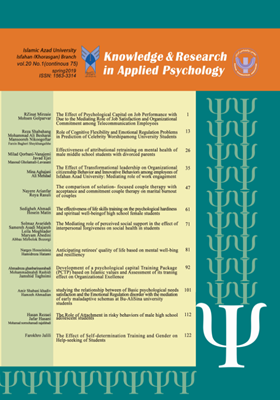Development of a psychological capital Training Package (PCTP) based on Islamic values and Assessment of its traning effect on Organizational Exellence
Subject Areas : Educationalahmadreza ghanbarinasrabadi 1 * , Mohammadmahdi Rashidi 2 , Jamshid Taghsimi 3
1 - shakhes pajouh research institute, isfahan, iran.
2 - Academic member, Institute for International Energy Studies(I.I.E.S),Tehran, Iran.
3 - Academic member, Shakhes pajouh research institute, Isfahan, iran.
Keywords: Islamic teachings, Organizational Excellence, psychological capital, isfahan mancipalty staff,
Abstract :
The main objective of this research was to provide a package of psychological capital training based on Islamic values and its effect on organizational excellence on employees of Isfahan Municipality. To evaluate the statistical assumptions, test and box test were used. In order to determine. Multivariate analysis of covariance analysis was used to investigate the effectiveness of Islamic-based psychological capital-based interventions on dependent variables. In the first stage, the research was qualitative and using Delphi technique. The data from interviews with humanities, religious scholars and ethics experts in the field of hope, self-efficacy, resilience, optimism were examined and a package of psychological capital was provided based on Islamic values. In the second stage of the study, quantitative studies were carried out and semi experimental methods were pre-test(n=60) and post-test with control group(N=3000). The results of quantitative research in two groups of control and traning in completing the “Organizational Excellence” questionnaire, Islamic psychological package showed that the mean score of organizational excellence in the experimental group in the post-test phase was more than the control group (P<0/01).Therefore, the study of Islamic psychological capital model has been able to increase the index of organizational excellence.
قرآن کریم.
اسدی، مهدی. (1392). تعالی سازمانی. تهران: نشر طراحان هومن.
احمدی م، نمازیزاده م، مختاری پ (۱۳۹۱) جو انگیزشی ادراک شده، خشنودی از نیازهای روانشناختی و انگیزش خودمختاری در ورزش کودکان پسر. پژوهش در مدیریت ورزشی و رفتار حرکتی، ۲ (۳)، ۱۲۵-۱۳۹.
رضایی، ع. م.، منش، س. ز. ح.، حسینی، ش. م.، بلوطبنگان، ا. ا. (۱۳۹۳). رابطه خلاقیت هیجانی و خودکارآمدی با عملکرد تحصیلی: نقش میانجی انگیزه پیشرفت، فصلنامة ابتکار و خلاقیت در علوم انسانی، ۴ (۳)، ۲۱.
شکری، ا؛ تاجیک اسماعیلی، ع؛ دانشورپور، ز؛ غنایی، ز (1386)، تفاوتهای فردی در سبکهای هویت و بهزیستی روانشناختی: نقش تعهد هویت. فصلنامه تازههای علوم شناختی، سال نهم، 2: 46-33
شهنی ییلاق، م، موحد، ا؛ شکرکن، ح (1383) رابطة علی بین نگرشهای مذهبی، خوشبینی، سلامت روان و سلامت جسمانی در دانشجویان دانشگاه شهید چمران اهواز. مجله علوم تربیتی و روانشناسی دانشگاه شهید چمران اهواز، 11(1 و 2)، 34-19
عابدینی، ح (1392) رابطة معنا و معنویت با بهزیستی روانشناختی، شادکامی شغلی و رضایت شغلی با توجه به نقش عاطفة وابسته به شغل. پایاننامه کارشناسی ارشد، روانشناسی صنعتی و سازمانی، دانشگاه آزاد اصفهان (خوراسگان)
عزیزی ابرقویی، م (1389) بررسی اثر معنویت درمانی بر میزان امید و کیفیت زندگی دانشجویان دانشگاه اصفهان. پایاننامه کارشناسی ارشد روانشناسی عمومی، دانشکده علوم تربیتی و روانشناسی، دانشگاه اصفهان
گلپرور، م، احدی، ح، جوادیان، ز (1391)، رابطة سرمایه معنوی با بهزیستی روانشناختی و معنوی. فصلنامة اخلاق در علوم و فناوری. سال هفتم، 4: 41-21
مرعشیان، ف و نادری، ف (1392) رابطة فرهنگ سازمانی، هوش هیجانی و سرمایة روانشناختی با خودکارآمدی شغلی و کارآفرینی سازمانی در کارکنان سازمان آب و برق خوزستان. دانش و پژوهش در روانشناسی کاربردی، سال چهاردهم، 3: 121-112
نجاری، ر، داناییفرد، ح، حضوری، م، صالحی، ع (1391) بررسی و تبیین نقش سرمایه روانشناختی در پیامدهای سازمانی. فصلنامة مدیریت سازمانهای دولتی. سال اول، 2: 36-24
هاشمی نصرتآباد، ت، باباپور خیرالدین، ج، بهادری خسروشاهی، ج (1391) نقش سرمایة روانشناختی در بهزیستی روانی با توجه به اثرات تعدیلی سرمایه اجتماعی. پژوهشهای روانشناسی اجتماعی،4: 123.
یارمحمدیان، م؛ شفیعپورمطلق، ف، فولادوند، م (1392) رابطة بین عدالت سازمانی، رضایت شغلی و اعتماد سازمانی و تعهد سازمانی با خودارزیابی از تعالی سازمانی بهمنظور ارائه یک مدل پیشبین. فصلنامه رهیافتی نو در مدیریت آموزشی، سال چهارم، 1: 18-1.
Abbas M, Raja U. (2011). Impact of Psychological Capital Innovative Performance and Job stress. 15 Th International Business Research Confrence (Ref No. 449). Melbourne, Australia: World Business Institute, Australia.
Avey J B, Reichard R J, Luthans F, Mhatre KH. (2011) Meta- analysis of the impact of positive psychological capital on employee attitudes, behaviors, and performance. Human resource development quarterly.22 (2): 127-152.
Hodges T.D. (2010) an experimental study of the impact of psychological capital on performance, engagement, and the contagion effect, [Thesis] Dissertation for the degree of doctor of Philosophy. Nebraska: Interdepartmental Area of Business (Management) University of Nebraska –Lincoln.
Luthans F, Youssef C. M. (2004) Human, social, and now positive psychological capital management: Investing in people for competitive advantage, Organizational Dynamics, 33(2), 143-160.
Luthans F., Avey J. B., Avolio B. J., Peterson S. J. (2010) The development and resulting performance impact of positive psychological capital. Human Resource Development Quarterly, 21(1), 41-67.
Luthans F., Youssef C., Avolio B. J. (2007) Psychological Capital: Developing the human competitive edge, Oxford University press.
McKenzie, J., & Aitken, P. (2014) Development of digital product catalogue for enabling agility in a manufacturing organization. Strategic HR Review, 11(6), 12-31.
Norman, S.M., Avey, J.B., Nimnicht, J.L. and Graber Pigeon, N. (2010) The Interactive Effects of Psychological Capital and Organizational Identity on Employee Organizational Citizenship and Deviance Behaviors. Journal of Leadership & Organizational Studies, 17, 380-391.
Peterson, C., Park, N., & Sweeney, P. J. (2008). Group well being: morale from a positive psychology perspective. Applied Psychology, 57, 19-36.
Snyder, C.R. (2000) The Past and Possible Futures of Hope. Journal of Social and Clinical Psychology, 19, 11-28.
Waite, P. and Richardson, G. 2002. Determining the efficacy of resilience training in the worksite. Journal of Allied Health, 33(3): 178–183
Yamaoka, K. (2008) Social capital and health and well-being in EastAsia: a population-based study. Journal Social Science & Medicine.66 (4), 885-99.
_||_
